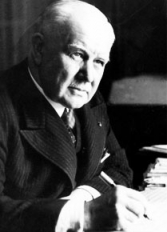Lehár, Franz
Operas

Franz Lehár was born in Komáron, the son of a bandmaster in the Austro-Hungarian army. After studying violin and composition at the Prague Conservatoire, he joined the army as a musician and played for a time in his father’s orchestra at the same desk as his friend and later composer-colleague Leo Fall. At the age of 20, he became the youngest bandmaster in the army with a 110-piece orchestra at Austria’s only naval base, Pola on the Adriatic.
Though his early opera Kukuschka was played in Leipzig and Budapest, it created little interest and he first came to notice when he wrote the ‘name waltz’ for Princess Metternich’s ‘Gold and Silver’ ball in 1902. As conductor at the Theater an der Wien, he was soon composing operetta, into which form he engagingly remarked years later “I stumbled blindly with no idea what I was doing”. The Merry Widow (1905) made him wealthy and internationally famous and was followed by Eva, The Count of Luxembourg and Gipsy Love before 1914, which increased still more his fame and fortune.
A relatively fallow period was succeeded by the great flowering of 1925 to 1934 in the operettas he created for Richard Tauber’s voice - Paganini, The Czarevitch, The Land of Smiles, Friederike, Schön ist die Welt and Giuditta, the last being premièred at the Vienna State Opera. From 1935, Lehár was principally occupied in establishing his publishing house, Glocken Verlag, in Vienna, into which he gathered almost all of his large output.
Josef Weinberger is proud to offer Lehár’s entire catalogue of operettas on behalf of Glocken Verlag. Individual excerpts from Lehár’s operettas, and individual concert works (such as the hugely popular “Gold and Silver Waltz”) are available to hire from the Concert Library.